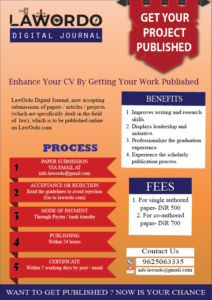Digital Platform, Intermediary and Copyright
 Author: Umang Kathuria
Author: Umang Kathuria
Institute: Amity Law School, Noida
DIGITAL PLATFORM, INTERMEDIARY AND COPYRIGHT
The digital platform is leading the world into easy way of task management and leisure. It is said to be mankind’s greatest achievement since civilized living. Digital platform has made work easy in every way whereas it has led to exploitation in many ways. As there have been pros and cons which come in light while talking about the digital world. Crime through digital mode is a major concern as if we discuss about cyber crime; there are various modes of fraudulent activities such as copyright infringement, hacking & virtual cloning. Intellectual property rights come handy in many ways and are a concern at this moment with growing web laws.
Digital Single Market imposes a liability on the online platforms to filter or remove any copyright material from their websites and places a responsibility on the website rather than the third party uploading the infringing material. EU directive article 13 states that “online content sharing service providers and right holders shall cooperate in good faith in order to ensure that unauthorized protected works or other subject matter is not available on their services.”[1]
 Click me to submit an article
Click me to submit an article
EU Article 13 in a nutshell
The EU article 13 was taken down and prior to the amendment, the right holders in case of copyright infringement had to submit a “takedown notice” in order for the platforms to take down the infringing content or the platform would face potential lawsuit . It was the right holder who used to search for infringing content. The current scenario of article 13 is that it eliminates the need for rights holders to search the web for infringement content. Instead, it makes platforms liable for copyrighted material uploaded by users. In such a case the platforms can be sued without even a takedown notice. Now once the Copyright infringement goes online the platform right away faces a chance of potential lawsuit. Any websites that host large amounts of user-generated content (YouTube, Twitter and Facebook) are responsible for taking down that content if it infringes on copyright. Whereas the Berne convention states certain policies towards fair use and if we discuss about the Indian context on fair use, there are four factors which are the purpose of use, the nature of the work, the amount of the work used, the effect of use of the work on the original.[2]
Amendment to Article 13
- Prior to the amendment, the right holders in copyright infringement case had to submit a “takedown notice” in order for the platforms to take down the infringing content or the platform would face potential lawsuit. It was the right holder who used to search for infringing content.
- In the current case, article 13, eliminates the need for rights holders to search the web for infringement content. Instead, it makes platforms liable for copyrighted material uploaded by users. In such a case the platforms can be sued without even a takedown notice. Now once the Copyright infringement goes online the platform right away faces a chance of potential lawsuit.
- Earlier under Article 13 “copyright filters” were to be implemented that would check every tweet, Facebook update, shared photo, uploaded video, and every other upload to see if anything in it was similar to items in a database of known copyrighted works, and block the upload if they found anything too similar.
- Now under Article 13 online services are not required to check everything that their users post to prevent copyright infringement, and rightsholders don’t have to get a court order to remove something they view as a copyright infringement. All they have to do is send a “takedown notice” and the services have to remove the post or face legal jeopardy.
 Click me to submit an article
Click me to submit an article
Present age scenario of EU Article 13
- The Direction on Copyright would make online platforms and offender sites liable for copyright infringements, and supposedly profit artists and journalists instead of tech giants.
- The internet is the heart of the new digital world where there is trend of advertising based web. The measures laid out in article 13 are aimed at levelling the main disparity between the big tech companies who earn massively providing access to content generated by other people, while all those who created the material (music, literature, journalism) are hardly left with anything.
- Article 13 take off the protection for web services and relieves rights holders of the need to look in the Internet for infringement and send out notices.[3] It rather says that websites have a duty to ensure that their users do not infringe copyright.
- Article 13 applies to every website with a form for uploading the content and every app with a ‘post’ button.[4] This gives copyright holder’s power over how internet platforms distribute their content”. Now, Publishers of all sects will have the right to decide terms for others to use their content commercially.
Kartar Singh Giani v. Ladha Singh
In this case, the High court held that: “two things have been quoted in relation with the meaning of the expression fair, in fair dealing (1) That in order to constitute unfairness there must be an intention to compete and to derive profit from such competition and (2) That unless the motive of the infringer were unfair in the sense of being improper the dealing would be fair.”[5]
Indian Laws
Section 79 of the information technology & intermediary rules 2011 states the liability of intermediaries. In India, prior to the 2015 an intermediary was required to either remove or block access to contention receiving notice of illegality of such content by monitoring content, communication to intermediary by an affected entity or by a notification from the government as per Section 79(3)(b) of the Information Technology Act, 2000 and the Intermediary Rules. This enabled the filing of numerous frivolous complaints and resulted in unnecessary takedowns by intermediaries. In 2015 the court in the Shreya Singhal case, read down the provisions to hold that such takedowns can only be preceded by a court order or a notification from the government. In doing so, the Court struck a balance between prevention of online censorship and protection of IP rights of content users. Unlike the European Parliament, the Indian Supreme Court makes a definite attempt to protect free speech rights of its citizens by providing a fair and balanced takedown mechanism.[6]
 Click me to submit an article
Click me to submit an article
Conclusion
Digital world growing needs rules to counter the original work of creators on the platform. There should be awareness programs and techniques for the general public so that they can protect their work from infringement. The role of intermediary needs to be confined and there is a need of change in laws. There is a rapid growth in digital platform as well as exploitation. Therefore, it needs protection against infringement which can be achieved with amendment and introduction of new laws.
[1]https://indivigital.com/resources/copyright/article-13/
[2]https://fairuse.stanford.edu/overview/fair-use/four-factors/
[3] https://publishingperspectives.com/2019/03/european-parliament-votes-in-favor-of-controversial-copyright-directive
[4] https://www.bbc.com/news/world-europe-44722406
[5]https://www.itagbs.com/articles/copyright_doctrine.html
[6]https://spicyip.com/2018/06/article-13-of-the-controversial-eu-copyright-directive.html
